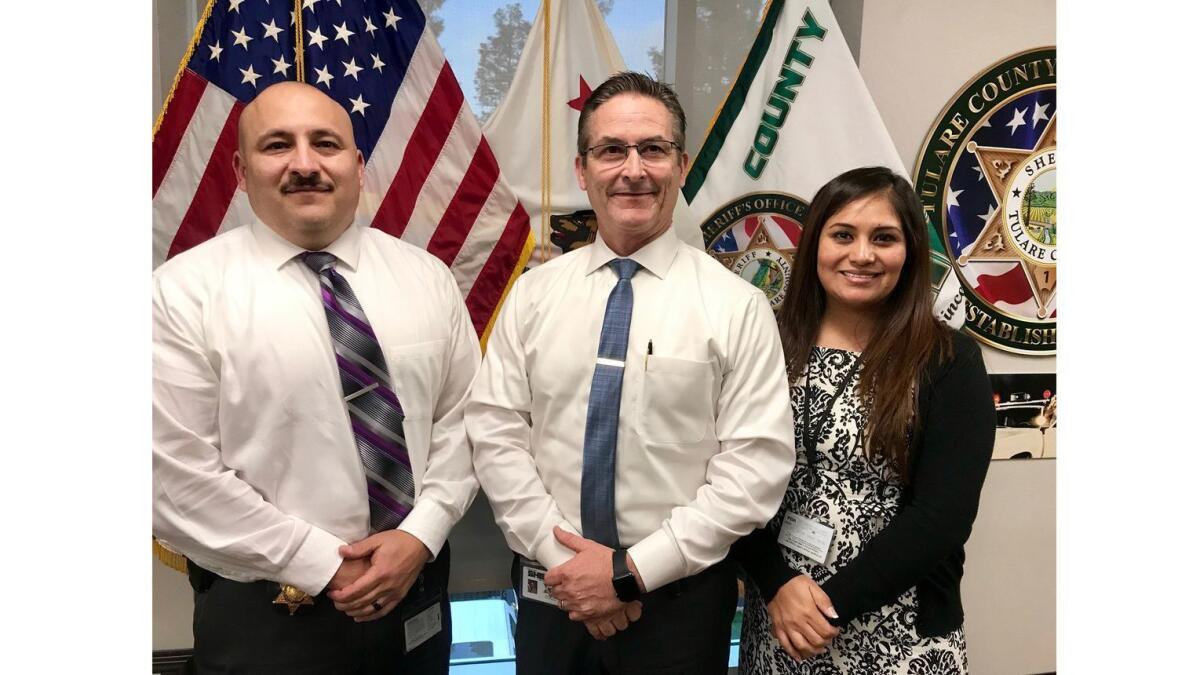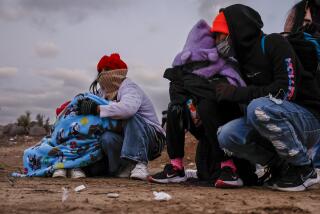Column: In the heart of California, a sheriff makes a case for a middle ground on immigration

Donald Trump easily won Tulare County in 2016, taking 53% of the vote to Hillary Clinton’s 41%, and Sheriff Mike Boudreaux proudly displays a photo of himself with the president on a shelf in his Visalia office.
But don’t jump to conclusions.
I was escorted to the sheriff’s office by a deputy who was born in Mexico, and whose family crossed the border illegally many years ago. Then I met Boudreaux’s captain of investigations, whose family also came to the country illegally as a child.
And on the way to Boudreaux’s office we passed a portrait of Ronald Reagan, who signed a 1986 bill giving amnesty to about 3 million immigrants in the country illegally.
Is it possible that in the charged, polarized divide over immigration and Trump’s border wall, there might be some middle ground in the middle of California?
It seemed that way, judging by my colleague Brittny Mejia’s story in early January about two high-profile crimes committed by men in the country illegally.
In December, Newman Police Officer Ronil Singh was shot and killed in Stanislaus County by a man named Gustavo Arriaga who had gang ties, prior arrests and had lived in the country illegally for years.
Two days earlier, in Tulare County, a twice-deported man named Gustavo Garcia committed a spate of crimes, according to police, shooting a farm worker, robbing a mini-mart at gunpoint and firing at several people before he was thrown from his vehicle and killed while driving the wrong way on a highway.
Garcia’s rampage began shortly after he was released from Tulare County Jail. Boudreaux said Garcia had been arrested for being under the influence, a misdemeanor, and that immigration authorities had asked that he be detained until they could pick him up. Under California’s sanctuary law, the sheriff could not honor that request without a federal warrant, which is why Garcia was released.
Boudreaux and Stanislaus County Sheriff Adam Christianson both blasted California’s Senate Bill 54, enacted a year ago, the law that keeps them from cooperating with Immigration and Customs Enforcement under most circumstances. But Boudreaux’s criticism, while vehement, came with a few caveats.
“We have a large agricultural community, we have a large population of undocumented persons that every day don’t violate the law,” Boudreaux said at the time. He had no beef with those people, he said. But when it comes to someone who is “a known criminal element,” he sees no reason for mercy.
Deputy Monserrat Meza and Capt. Gabriel Macias, each undocumented at one time, sat in when I interviewed the sheriff, and they agreed with the boss. Informed by their own experiences, they understand the desire to cross the border in the hope of building a better life. But the law-abiding undocumented community is the group most victimized by undocumented criminals, they said.
“I worked in the fields until I was a teenager,” said Macias. “I didn’t even know I wasn’t born in the U.S. until I was like 7 or 8…The people we’re focusing on aren’t the ones who are working and trying to better their kids’ lives. It’s the criminals involved in human trafficking and murdering and raping people.”
Boudreaux said he has no problem with President Obama’s DACA program, which offered protections for young immigrants brought to the country illegally by their parents.
“I was raised to have an open mind [with regard to] compassion and understanding,” Boudreaux said.
His father was a Tulare County deputy sheriff for 30 years, and his mother was a tech at a psychiatric facility. Boudreaux went to Porterville High School and said that when he was a youngster in the largely Latino community, it was common knowledge — and not a big concern — that some residents were undocumented.
Boudreaux thinks the national security threat is greater today than it was when he was a kid, and illegal immigration has to be cut off. But for those already here, he’s not a hard-liner.
“There should be a system for all those here illegally to report themselves without fear of being deported,” Boudreaux said. “Let’s create a document that allows for a pathway to citizenship if you’re here say three, five, seven years, and you don’t commit any crimes.”
Those are not words we’re likely to hear from Trump.
When I asked Boudreaux about the photo on his shelf, he said it was taken when Trump visited the area during his campaign. Boudreaux said he thinks Trump’s position then and now was that only violent criminals should be deported.
But Boudreaux draws a line here:
“I do not believe that local law enforcement should enforce immigration law,” he said. “I can’t turn a blind eye to victims of crime whether they’re documented or undocumented, and they need to feel comfortable enough to report that they’re victims.”
The day I met with Boudreaux, Trump visited the border in Texas to stump for the funding of a wall. Cherry-picking isolated horrors like the crimes in Stanislaus and Tulare, he has huffed and puffed for months about a national emergency that can only be stopped with a wall.
Never mind the sharp decline in illegal immigration since the turn of the century, evidence that crime rates among immigrants here illegally are lower than among citizens, the fact that many of the people here illegally didn’t sneak across the border at all, but overstayed visas, or the fact that there are a dozen better ways to control illegal immigration than spending $25 billion adding to what is already a lot of fencing on the border.
“I do believe there’s a purpose for a wall, or call it a fence,” said Boudreaux. But he added that technology, drones, aircraft surveillance, greater port security and border patrol manpower should be getting just as much attention.
Vincent Salinas, a Republican who chairs the Latino Political Action Committee of Tulare County, is not a fan of Trump or the wall.
“If you’re talking about securing the border, why doesn’t Homeland Security provide ICE or the FBI the resources to track and arrest people here illegally?” Salinas asked.
Boudreaux doesn’t disagree, and he is still deeply frustrated about having to release a guy “who went and shot up our county.”
“Why can’t I talk to ICE about this?” he asked. “When they send me a detainer, why can’t I get on the phone and say, ‘Hey, guys, tell me why you want him’? And they can say: ‘He’s been deported twice. Recognize the detainer for 48 hours and we’ll get you a warrant.’”
California’s sanctuary laws grew out of an understanding that most immigrants have fled poverty and violence and that they make cultural and economic contributions, so they deserve some basic rights. But Boudreaux’s job, as he says, is public safety, and his take doesn’t sound unreasonable to me.
“The narrative becomes distorted so far to the left and so far to the right, and I think what most people are looking for is common sense decision-making to the benefit of everyone,” said Boudreaux, who told me he has put in a request to meet with Gov. Gavin Newsom and make his feelings known.
“We have people here wanting to make better lives for themselves,” Boudreaux said. “That pathway needs to be easier. But the pathway for criminals needs to be harder.”
Get more of Steve Lopez’s work and follow him on Twitter @LATstevelopez
More to Read
Start your day right
Sign up for Essential California for news, features and recommendations from the L.A. Times and beyond in your inbox six days a week.
You may occasionally receive promotional content from the Los Angeles Times.







